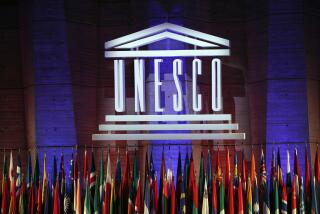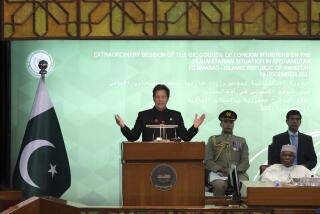Islamic nations avoid condemning U.S. attacks
- Share via
DOHA, Qatar — The world’s largest Muslim organization handed the United States a diplomatic victory Wednesday, avoiding condemnation of the U.S.-led attacks against the Taliban in Afghanistan while urging resolution of the Middle East peace process.
In a surprisingly swift and unanimous action, the often-fractious 56-nation Organization of the Islamic Conference group took less than four hours to issue a statement that gave implicit support to a carefully targeted campaign against the extremist Islamic Taliban.
The measured language by delegates such as Palestinian Authority President Yasser Arafat was the strongest sign yet of a shift of opinion in the Arab world from strong opposition to grudging acceptance of U.S. strikes against a fellow Muslim country.
Conference members also expressed strong sympathy for the victims of the Sept. 11 attacks against the United States.
The terrorists “have forced the international community and the United Nations to stand up to them, to reject them, to do whatever necessary to stop them and to lay the fundaments for a new basis for relations among the states and people of the international community,” Arafat said.
Just a week before Wednesday’s emergency summit, called in response to the terrorist strikes, Muslim states such as Malaysia announced they would denounce any moves against a fellow Muslim country.
U.S. officials who monitored the conference credited the shift to a realization among some Muslim nations of the diplomatic value of their support -- tacit or otherwise -- for the coalition against terror.
The bombing attacks have provided a window of opportunity for Muslim countries to renew ties to the United States that markedly deteriorated after the 1991 Persian Gulf War amid the punishing U.S.-sponsored sanctions against Iraq and the intifada that pits the Palestinians against Israel.
Muslim nations are also worried about a spread of the anti-American conflict to their own soil, either in the form of terrorist attacks against repressive ruling regimes, or in the form of further U.S. action targeted at states such as Iraq or Iran.
The U.S. ambassador to the United Nations, John Negroponte, has refused to rule out future military action against other countries in its war on terror, an implied threat that left many at the conference confused, angry and anxious for better relations with the United States.
“The entire political future of the region is unsettled and alarming,” said Abdelouahed Belkeziz, the organization’s secretary-general.
U.S. officials said the conference results show that Muslim countries have recognized the inherent danger represented by Osama bin Laden, who has threatened to topple the Saudi government for allowing U.S. troops to be based there.
Another factor is the unpopularity of the Taliban government, whose austere interpretation of Islamic law is at odds with much of the Muslim world.
Many of those in attendance at the conference renewed their calls to see evidence against Bin Laden as the author of the Sept. 11 attacks. And they asked for a restrained and controlled response that avoided Afghan civilian deaths.
One of the conference’s few concrete achievements came when the Qatar government, along with several other member nations, created a pool of $14 million to help the Afghan people.
The delegates also called for a U.N. conference on terrorism and an attempt to resolve the conflict through peaceful means.
“The Islamic world was among the first to have called for the dialogue of civilizations as a means for interaction, agreement and rapprochement of other peoples, instead of falling into conflicting sects and camps based on the principle of ‘If you are not my side, then you are against me,’” said the chairman of the conference and ruler of Qatar, Sheik Hamad ibn Khalifa al Thani.
The statement was a pointed reference to President Bush’s “with us or against us” litmus test applied to nations in the days after the Sept. 11 attacks.
But if the delegates constrained themselves in talking of the attacks on Afghanistan, they made up for it with vitriol directed at Israel.
The rhetoric was venomous, condemning Israel as a sponsor of “state terrorism” against Palestinians during the intifada, which has resulted in the deaths of more than 800 people, most of them Palestinians, during the last year.
The delegates also rejected any attempts to categorize Islamic groups such as Hezbollah and Hamas as terrorists, although both groups have targeted civilians and military in suicide bombing missions in the past.
“The conference stressed its rejection of any linkage between terrorism and Islamic and Arab people’s rights, including the Palestinian and Lebanese people’s rights to self determination, self-defense, sovereignty (and) resistance against Israel and foreign occupation,” the consensus statement read.
Arafat charged that Israel is using the aftermath of the Sept. 11 attacks as cover to step up its campaign against Palestinians. At one point, Sheik Hamad even seemed to blame Israel for the Sept. 11 attacks.
More to Read
Sign up for Essential California
The most important California stories and recommendations in your inbox every morning.
You may occasionally receive promotional content from the Los Angeles Times.













